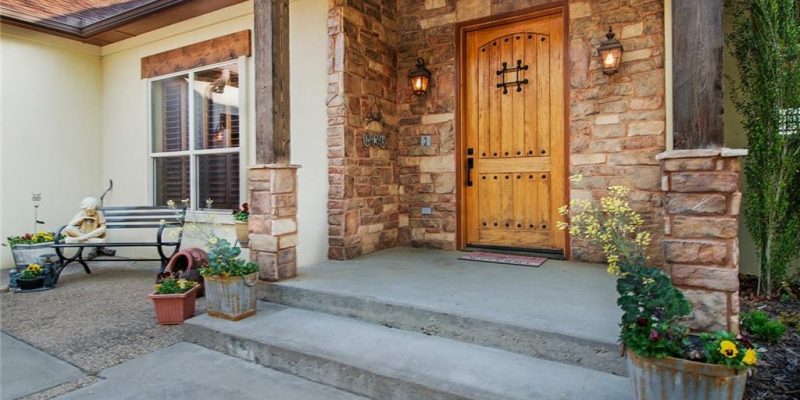Originally posted at Cleveland Appraisal Blog
Are you thinking about going Beverly Hills style and installing a cement pond? You’re not alone. Pools are becoming increasingly popular in more recent times. I think that part of the reason is that there are many products out there that make caring for a pool much easier these days. Additionally, many people enjoy the privacy of having their own pool instead of going to a public pool.
The million dollar question is whether or not a pool will add value to your home. It really depends! Let’s talk about it.
ABOVE GROUND POOLS
Above ground pools are among the most popular in my area because they are relatively inexpensive. I have seen some pretty cool set-ups. Many build nice decking around this kind of pool so that you get the in-ground pool feel without spending a ton of money.
The downside is that most lenders consider these kinds of pools to be personal property. This is because they can be moved. (Although, I have never heard of anyone ever-moving one.) The other reason they don’t really add any major value is because of their quality. Above ground pools have a relatively short life in comparison to in-ground pools.
These kind of pools are great if you would like a pool. But no matter how “decked” out they are, don’t expect any major value return to your home with this kind of pool. That being said, there may be some value in the deck itself, depending on how it is built.
IN-GROUND POOLS
Years ago, many appraisers in this area would say that even in-ground pools don’t add much, if any, value. That really depends on a number of things though. I have seen some in-ground pools on properties in which the lot size is so small that the pool took up the majority of the back yard. Usually, in higher density areas where lots are small and homes prices are on the lower end of the market, in-ground pools often don’t add much if any value and may actually be considered to be an over-improvement. If this is the case, it could actually have a negative impact on a home’s market value.
However, in neighborhoods with larger lots and/or in neighborhoods where home prices are selling in more of the median to upper end housing range, in-ground pools do typically add relatively decent value. Since values differ from neighborhood to neighborhood, I really cannot provide an exact number or percentage. Over the years, I have seen a growing popularity for in-ground pools. In some cases, they can add tens of thousands of dollars in market value. Of course, don’t plan on getting a dollar for dollar return on investment for this kind of improvement, or any other for that matter.
INDOOR POOLS
Pools of this kind are typically seen in luxury homes. There are not as many of these kinds of pools around. I have appraised numerous homes in Northeast Ohio that offer indoor pools. The appeal is that they can be used all year round. You would think that they would bring a greater return on the dollar for this reason. Sometimes it does. However, in my experience, sometimes indoor pools actually bring less return on investment than an exterior, in-ground pool. This is because they are expensive to build. Additionally, indoor pools tend to limited the number of people in the market that desire such an amenity. They really require more maintenance in many ways.
I have appraised homes with indoor pools in the basement. Some, attached to the exterior of the home, and others that have been completely detached from the home. When appraising a home with this kind of pool, it is important to try to find other sales with a relatively comparable indoor pool. It’s not easy, but they are out there.
I have seen people build an out-building with an above ground pool inside. There would be no value in the pool. (“A” for effort). However, out-buildings themselves, typically add value to a property. With indoor pools, it’s good to also remember that proper ventilation is important. If not vented properly, too much moisture can be problematic, including potential mold issues.
If you’re purchasing a home with an indoor pool, I would strongly recommend hiring a qualified professional to inspect the pool and make sure that there are no issues, including to the ventilation system.
Even if the indoor pool is attached to the main dwelling, generally speaking, we do not include this area in the GLA (gross living area).
You might be wondering if the square footage of an indoor pool is considered in the gross living area. Even if the indoor pool is attached to the main dwelling, generally speaking, we do not include this area in the GLA (gross living area). Typically it is valued as a separate amenity, which gets tricky at times depending on the layout and location of the pool.
OTHER THINGS TO KEEP IN MIND
Pools can offer different amenities like diving boards, slides, attached hot tubs and waterfalls. Pools also offer different shapes. I’ve never been able to find a major value difference for these differences. They may be there. But it’s difficult to prove. Also, pool size, at least in my experience, does not make a huge difference in most cases. Of course, most pools in my market are fairly comparable in terms of size.
It’s also important to keep in mind that most municipalities have requirements that need to be followed. For instance, most require some kind of fencing around the pool to keep little ones from accidentally falling in. So, factor that into your proposed costs. Part of pool safety includes having it covered in the winter months to keep someone from falling into a drained pool and being injured.
Also, when it comes to value, a pool not only has to be safe, it also needs to be in a “sound” condition. It has to be operational with no major repairs needed, which is true of any amenity.
If you’re thinking of having a pool installed, just count the costs ahead of time. Even if the ROI (return on investment) is less than what you hoped for, if you’re going to enjoy it, and if you don’t plan on moving for years, it may be worth it. There are other values besides market value to think about. Like, the value you and your family will enjoy using this amenity. If you’re afraid that the investment may be an over-improvement or if you would like to know the contributory value of a pool in your area, give a state licensed or certified appraiser a call. They can provide you with information that can assist you in deciding if a pool is worth the investment. If you decide to take the plunge, enjoy!
Related Posts
4 Reasons to Buy a Home in the Fall/Winter
Beware of Over-improving Your Home
How I handled 15 Showings in 3 Days with 2 Kids and 2 Dogs
3 Tips to Help Increase Your Home Value in 2019



